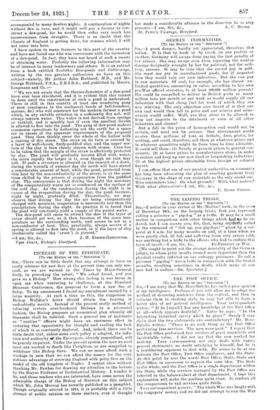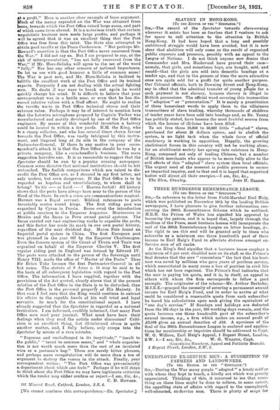THE POST OFFICE.
[To THE EDITOR or THE " SPECTATOR."] Sta,—I am sorry that Mg. Hore-Belisha has such a peer opinion of my intelligence. Perhaps if you will allow me to adopt his method of divorcing sentences from the context, and then to criticize them in slashing style, ho may feel able to form a better idea of my general intelligence. Your correspondent writes: " If lie [myself] has any knowledge of the Past Office
at all—which appears doubtful." Later he says: "In the interesting historical survey which ho gives." Surely I may claim that the two statements are contradictory? Mr. Hove- Belisha writes: "There is no such thing as the Post Office performing free services. The men were paid." I repeat that the Post Office performed free services of great magnitude and incalculable value. I did not say that the men worked for nothing. Your correspondent not only deals with vague, general statements, no doubt satisfying to himself, but he is a bewildering opponent to deal with. Ile seems to be at sea between the Post Office, Poet Office employees, and the State. At this point he uses the words Post Office, State, State and Past Office, in succession to express the same idea. The State is the whole, and the Post Office is a single department within the State, while the services managed by the Post Office are reflected in the balance-sheet of that department. I hope this explanation will make the position quite clear. It renders all the comparisons to rail services quite futile.
Your correspondent asserts "The whole War was fought with the taxpayers' money, and we did not attempt to run the Wur
ot a profit." Here is another clear example of loose argument. Ruch of the money expended on the War was obtained from loans, towards which the Post Office raised large sums, and part of which came from abroad. It is a notorious truth that certain Unpatriotic business men made large profits, and perhaps it will be agreed that it was an excellent thing that the Post Office was free from this taint. The State also attempted to obtain good results at the Peace Conference. " But perhaps Mr. Howard's assertion is that the Post Office never recovered from the War." I did not say so. But I am prepared to say, at the risk of misrepresentation, "has not fully recovered from the War," if Mr. Hore-Belisha will agree to the use of the word " fully." Nor has any other concern of national importance. Do let us use with good humour a little of common sense I The War is past now, and Mr. Hore-Belisha is inclined to belittle the excellent work of the Post Office and its trained experts. Purposely I am not dealing with the actual fighting men. No doubt if war were to break out again he would quickly change his mind. It is difficult to believe that your correspondent was in a battle zone, or even that he has dis- cUssed relative values with a Staff officer. He ought to realize the terrific waste in Post Office technical -stores and their extreme value. Perhaps it may be of interest to mention. here that the hot-wire microphone proposed by Captain Tucker was manufactured and mainly developed by one of the Post Office engineers. By means of this wonderful invention a battery could be located to within a few yards. H.M. the King, who is a stamp collector, and who has several times shown favour towards the Post Office, was vastly intrigued by this instru- ment, and lingered long at its side in the company of the Postmaster-General. If there is any motive in your corre- spondent's attack it is that the Post Office should be run by a private company, like a cornchandler's business. The mere suggestion horrifies one. It is as reasonable to suggest that the Spectator should be run by a popular evening newspaper. Common sense dictates that national institutions should be left untouched. The foolish comparisons which are raised to dis- credit the Post Office are, as I stressed in my first letter, not only useless, but even dangerous. If the Post Office is to be regarded as hopeless and unsatisfactory, to whom shall it belong? To Sir — or Lord —? Heaven forbid! All history shows that the posts have always been near to the person of the Head of the State. In such a sense are communications magical. Hermes was a Royal servant Biblical references to posts invariably centre round kings. The first riding post was organized by Cyrus in Persia. Rome owed the introduction of public couriers to the Emperor Augustus. Montezuma in Mexico and the Incas in Peru owned postal systems. The Incas carried out vast engineering works to expedite tho posts, and this factor has made its mark in our own postal history, regardless of the next dividend day. Marco Polo found an Imperial postal system in China. The first European post was planned in the year 807 by the Emperor Charlemagne. Even the famous system of the Count of Thurn and Taxis was organized on behalf of the Emperor Charles V. The first regular riding post in England was formed by Edward IV. The posts were attached to the person of the Sovereign until Henry VIII. made the office of "Master of the Posts." Thus Sir Brian Tuke became the first Postmaster-General in all but name. The statute of 9 Anne c. 10 may be said to be the basis of all subsequent legislation with regard to the Post Office. The information I have supplied, together with the provisions of the Act quoted, clearly shows that if the present relation of the Post Office to the State is to be disturbed, then the Post Office is the personal property of His Majesty. In that case I feel sure that the King would continue to entrust his affairs to the capable hands of his well tried and loyal servants. So much for the constitutional aspect. I have already suggested that the Spectator is regarded as a national institution. I am informed, credibly informed, that many Post Office men. read your journal. What must have been their feelings when they read the article under discussion? Criti- cism is an excellent thing, but ill-informed abuse is quite another matter, and, I fully believe, only creeps into the Spectator by means of a rare mistake.
" Supreme and unchallenged in its ineptitude," " insult to the public," " taunt to common sense," and " whole organiza- tion is not worth much more than the cost of an insulated wire or a postman's bag." These are surely bitter phrases, and perhaps mere recapitulation will do more than a ton of argument to destroy the venom in the attack. Finally, your correspondent writes: " The Post Office was pre-eminently a department about which one feels." Perhaps if he will deign to think about the Post Office we may have legitimate criticism which the reader may either confirm or reject.—I am, Sir, &c.,
182 Minard Road, Catford, London, S.E. 6. C. D. HOWARD.
[We cannot continue this correspondence.—En. Spectator.]



































 Previous page
Previous page